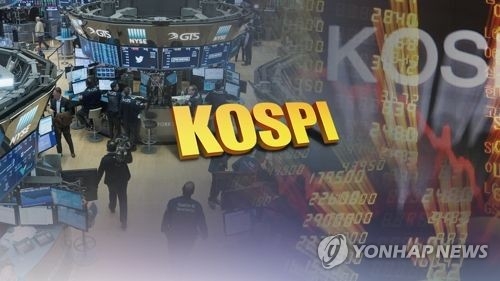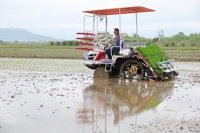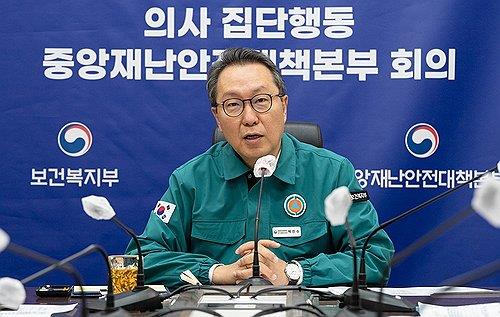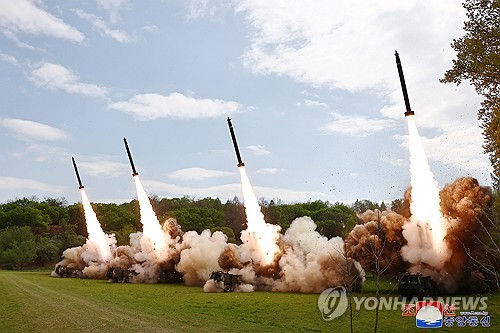Securities firms adjust down stock market outlook
SEOUL, June 18 (Yonhap) -- Local securities firms have adjusted down their outlook for the main stock market but are raising the possibility of a brighter second half, financial watchers said Monday.
Cape Investment & Securities had predicted the KOSPI would move between 2,400 and 3,200 points this year, but it has lowered the upper limit of the band to 2,930. Kiwoom Securities initially projected the KOSPI to climb to 2,919, with a chance of reaching above 3,000. Its latest outlook for the peak is 2,887. Daishin Securities was one of the earlier adjusters, resetting its prospects of between 2,500 and 3,000 points to 2,350-2,750 points in April.
NH Investment & Securities, Meritz Securities Co., Hana Financial Investment Co. and HI Investment & Securities have also lowered their projected highs to between 2,750 and 2,850 points.
Samsung Securities, whose earlier estimate was 2,400-3,100 points, is expected to officially lower its expectations soon.
Shinhan Investment Corp. is the only one to not have changed the upper limit, having projected 2,800 in its outlook at the start of this year. It raised the lower limit of the band from 2,250 points to 2,350 points.
Financial watchers said the rosy picture the firms had painted earlier was shown to be wrong as the central banks in the United States and Europe turned hawkish and trade protectionism grew stronger globally, putting emerging markets at risk.
"The fundamentals of the stock market have not changed, but there were many external issues like rate rises in the U.S. gaining speed and the U.S.-China trade war," Yoon Young-gyo of Cape Investment said.
Others blamed the weakened prospects on corporate performances.
"We are adjusting the KOSPI band down because although we maintain the expectation of corporate profits increasing, the outlook for profit retreated because of the imbalance between industries," Yoo Seung-min of Samsung said. "Semiconductors are showing a strong exports increase in the 40 percent range, but the circumstances are still difficult for automobiles and other key export products, and the recovery in shipbuilding, heavy and chemical industries is still not meeting expectations."
A turning point may come in third or fourth quarter, according to analysts at the securities firms. The U.S. key rate increase is raising fears of capital exits at emerging markets, but the rise testifies to the soundness of the global economy on the whole, analysts say.
Given the warming geopolitical climate around the Korean Peninsula, once corporate performances prove to be positive through earnings reports in the second half, the KOSPI could gain traction, according to the analysts.
"The KOSPI will start to climb again after the second-quarter earnings report in mid- and late July and hit the year's top in late third quarter or early fourth quarter," Yoon projected.
Hong Choon-uk of Kiwoom noted that the U.S. Fed had judged the economy was strong enough to be able to handle two more rate increases in the latter half of the year. "The rate hike and the subsequent strengthening of the dollar are positive elements for South Korea's exports," he said.
"Considering the corporate profits, South Korean stocks are still undervalued," Hong added. "The KOSPI will likely hit the bottom around the end of June, pick up after the earnings reports in July and improve as we get close to end of the year."
Park Hyung-joong of Daishin, one of the pessimists, said the monetary tightening in advanced markets is stronger than thought and will likely have negative impact on stock markets of emerging countries. "The stronger dollar, the slowdown in China's economy and trade war issues take away expectations for the stock market for the second half," he said. "There aren't many factors for positivity until next year to warrant investment in risky assets. One should pull out the stocks when the (KOSPI) rises in end-July or early August and move to safer assets."
(END)
-
 Overdue debut of Korean abstract art pioneer Yoo Young-kuk at Venice Biennale
Overdue debut of Korean abstract art pioneer Yoo Young-kuk at Venice Biennale -
 Relax, immerse yourself in scents at Venice Biennale's Korean Pavilion
Relax, immerse yourself in scents at Venice Biennale's Korean Pavilion -
 S. Korea marks 30th anniv. of Korean Pavilion at Venice Biennale with contemporary art
S. Korea marks 30th anniv. of Korean Pavilion at Venice Biennale with contemporary art -
 Ex-Justice Minister Cho slams Yoon's statement on crushing election defeat
Ex-Justice Minister Cho slams Yoon's statement on crushing election defeat -
 Artist Lee Bae captures ethereal Korean aesthetics at Venice Biennale
Artist Lee Bae captures ethereal Korean aesthetics at Venice Biennale
-
 Overdue debut of Korean abstract art pioneer Yoo Young-kuk at Venice Biennale
Overdue debut of Korean abstract art pioneer Yoo Young-kuk at Venice Biennale -
 Relax, immerse yourself in scents at Venice Biennale's Korean Pavilion
Relax, immerse yourself in scents at Venice Biennale's Korean Pavilion -
 Artist Lee Bae captures ethereal Korean aesthetics at Venice Biennale
Artist Lee Bae captures ethereal Korean aesthetics at Venice Biennale -
 S. Korea marks 30th anniv. of Korean Pavilion at Venice Biennale with contemporary art
S. Korea marks 30th anniv. of Korean Pavilion at Venice Biennale with contemporary art -
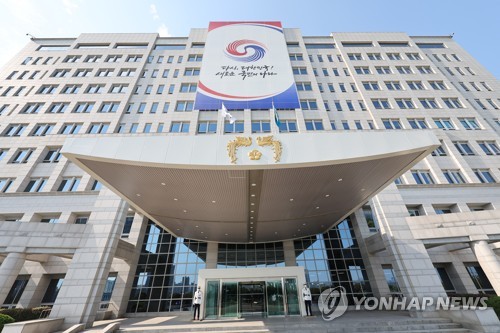 (LEAD) Presidential office denies Moon aides under consideration for PM, chief of staff
(LEAD) Presidential office denies Moon aides under consideration for PM, chief of staff
-
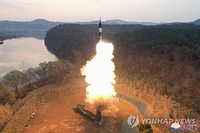 (LEAD) N. Korea fires several short-range ballistic missiles toward East Sea: JCS
(LEAD) N. Korea fires several short-range ballistic missiles toward East Sea: JCS -
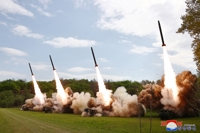 (LEAD) N. Korea says Kim guided simulated nuclear counterattack drill
(LEAD) N. Korea says Kim guided simulated nuclear counterattack drill -
 Hybe launches audit into NewJeans' label ADOR over alleged independence move
Hybe launches audit into NewJeans' label ADOR over alleged independence move -
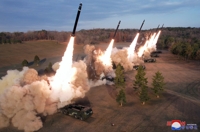 N. Korea says Kim guided simulated nuclear counterattack drills for 1st time
N. Korea says Kim guided simulated nuclear counterattack drills for 1st time -
 Hybe says spinoff attempt by subsidiary label revealed clearly
Hybe says spinoff attempt by subsidiary label revealed clearly
